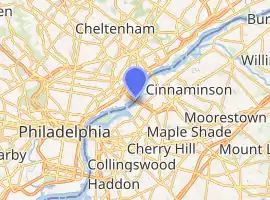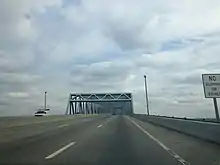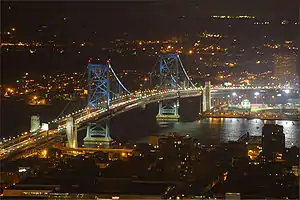Betsy Ross Bridge
The Betsy Ross Bridge, also known as the Ross Memorial Bridge, is a continuous steel truss bridge spanning the Delaware River from the City of Philadelphia in Pennsylvania to Pennsauken, New Jersey. It was built from 1969 to 1974, and opened in April 1976, during the American Bicentennial Year. It was originally planned to be named as the "Delair Bridge", after a paralleling vertical lift bridge owned by Pennsylvania Railroad (which is now used by Conrail and New Jersey Transit's Atlantic City Line), but was instead later named for Betsy Ross, a Philadelphia seamstress and reputed creator of the first American flag in 1776, making it the first automotive bridge named for a woman in America[2] and the second bridge overall (after Iowa's Boone High Bridge was renamed the Kate Shelley High Bridge in 1912[3]). The bridge is adjacent to the mouth of Frankford Creek.
Betsy Ross Bridge | |
|---|---|
 The continuous truss structure of the Betsy Ross Bridge | |
| Coordinates | 39.98595°N 75.06676°W |
| Carries | 6 lanes of |
| Crosses | Delaware River |
| Locale | Philadelphia (Bridesburg), Pennsylvania and Pennsauken Township, New Jersey |
| Official name | Betsy Ross Bridge |
| Other name(s) | Ross Memorial Bridge |
| Maintained by | Delaware River Port Authority of Pennsylvania and New Jersey |
| ID number | 4500011 |
| Characteristics | |
| Design | Steel continuous truss bridge |
| Total length | 8,485 feet (2,586 meters) |
| Width | 105 feet 4 inches (32.11 meters) |
| Longest span | 729 feet (222 meters) |
| Clearance above | 37.66 feet (11.48 meters) |
| Clearance below | 135 feet (41 meters) |
| History | |
| Construction cost | $103 million[1] |
| Opened | April 30, 1976[2] |
| Statistics | |
| Daily traffic | 39,980 (2000) |
| Toll | $5.00 (westbound) (E-ZPass) |
| Location | |

| |

History

Construction began in 1969, and was completed in 1974. However, the bridge did not open to traffic until April 30, 1976[2][4] due to numerous problems with the communities where the bridge's ramps to and from Richmond Street were located. The problems (concerns over traffic, especially heavy trucks) were also related to the highway route's planned extension to the northwest from the Delaware River, across Northeast Philadelphia to connect with the Roosevelt Expressway. The cancellation of this extension, the planned Pennsylvania Route 90 (PA 90 - known as the Pulaski Expressway) resulted in the so-called "Evel Knievel" ghost ramps – with unfinished bridges and fly-over ramps, some of which were later constructed to serve nearby Aramingo Avenue in the city's Bridesburg section. Currently, the route serves as a high-level multi-lane (six lanes, separated by a concrete median barrier) bypass of the three-lane Tacony-Palmyra Bridge, which has a drawbridge on the span.
Construction in 1988 connected the bridge to New Jersey Route 90, allowing drivers to use Route 90 to access Route 73, rather than via U.S. Route 130.[5]
The bridge has a total length of 8,485 feet (2,586 m), and a main span of 729 feet (222 m). Though originally constructed with eight lanes, the bridge was reduced to six lanes with two shoulders in 2000. The bridge is owned and operated by the Delaware River Port Authority.
When approaching the exits from I-95 in Philadelphia for this bridge, drivers see signs referring to NJ Route 90. Beyond the toll plaza, which is on the New Jersey side, Route 90 continues as an expressway with maximum speed limit of 50 mph (80 km/h), and in a few miles ends with a merge onto southbound Route 73. The toll plaza (westbound tolls only) is 12 lanes wide, and since 2000 has been a participating E-ZPass facility.
Tolls
A $5.00 one-way toll is charged entering Pennsylvania for passenger vehicles (less than 7,000 lb (3,200 kg) gross vehicle weight). An $18 credit was previously given on a per tag basis for DRPA-issued E-ZPass tags that crossed one of the four DRPA bridges 18 times in a calendar month. This discount had been suspended in 2010 but was since reinstated.[6] Trucks, commercial vehicles, mobile homes, and recreational vehicles (weighing at least 7,000 lb (3,200 kg) gross vehicle weight) pay $7 cash per axle. Seniors aged 65 and over can use a ticket program to pay $2.00 per trip (not integrated with E-ZPass).
Plans
In 2011, the DRPA initiated the process of awarding an engineering contract to plan out the redecking of the bridge, as the concrete deck, its asphalt overlay, and the joints between the concrete have deteriorated after 35 years of service. Upon approval of the contract by the DRPA Board, the study is expected to take 30 months. No cost estimates or time frame for the actual redecking project have been announced.[7]
With related improvements to Interstate 95 through Northeastern Philadelphia county,[8] the Betsy Ross Bridge Interchange Project (Exit 26) was initiated in March 2015 [9] to replace the decking on the ramps on the Pennsylvania side of the bridge and complete the access ramps to Aramingo Avenue.[10]
References
- Richman, Steven M. (Mar 16, 2005). The Bridges of New Jersey: Portraits of Garden State Crossings. Rutgers University Press. p. 88. ISBN 9780813537825. Retrieved November 26, 2017.
- "Archived copy". Archived from the original on 2009-03-26. Retrieved 2013-12-02.CS1 maint: archived copy as title (link)
- "Archived copy" (PDF). Archived from the original (PDF) on 2008-10-02. Retrieved 2008-05-14.CS1 maint: archived copy as title (link)
- http://www.phillyroads.com/crossings/betsy-ross/
- "Delays Likely on Palisades Parkway", The New York Times, June 5, 1988. Accessed October 12, 2007. "In South Jersey, there will be partial lane closings this month on Route 73, between Route 130 in Pennsauken and High Street in Maple Shade, for work on Route 90. The latter will connect the Betsy Ross Bridge across the Delaware River to Route 73 in Burlington County this fall. Bridge traffic must now go north on Route 130 in Camden County to reach Route 73 before continuing east."
- "Monthly discount suggested for DRPA bridges"
- Nussbaum, Paul (April 7, 2011). "DRPA panel takes first steps to repairing Betsy Ross Bridge". The Philadelphia Inquirer. Retrieved 28 April 2011.
- "Revive95". 95revive.com. Retrieved 20 August 2017.
- "Betsy Ross Bridge Interchange Project". 95revive.com. March 2015. Retrieved 20 August 2017.
- "Betsy Ross Bridge Interchange Construction Update". 95revive.com. August 20, 2017. Retrieved 24 March 2017.

